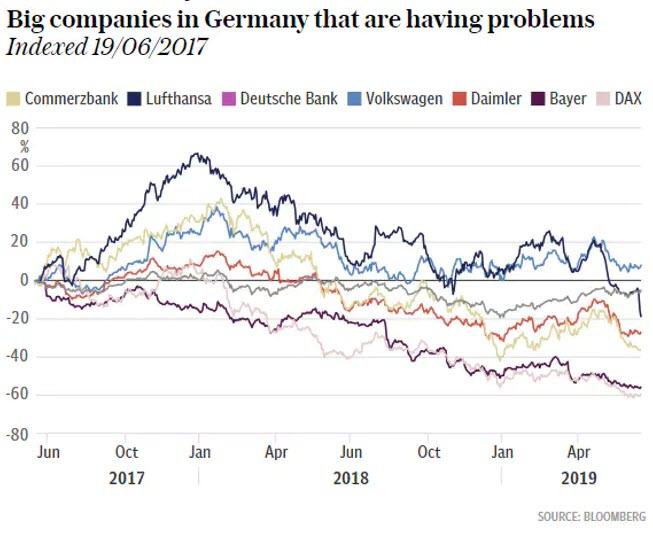Authored by Mike Shedlock via MishTalk,
The Green Party is on the rise in Europe. Ramifications are immense, starting with the deindustrialization of Germany…
Germany’s Green party killed nuclear power. German Chancellor Angela Merkel, once a strong supporter of nuclear energy, reversed course in a nod to the Greens. It did her party, nor Germany, any good.
Diesel is dead, and rightfully so, but Germany is not prepared for it. The Greens are also after coal, GMOs, and in general big business.
These Green events coupled with a false sense of invincibility are at the center of the Demise of Deutschland and its vaunted export machine.
Germany’s once seemingly untouchable national champions – from VW and Deutsche Bank to Bayer and Wirecard – have been gripped by scandal and crisis. Business rivals are asking each other how much worse it can get for Deutschland AG.
Wolfsburg-based car maker Volkswagen is trying to move on from its 2015 diesel emissions scandal but, alongside its German rivals BMW and Mercedes-Benz owner Daimler, it could be hit with further fines by EU regulators over claims they colluded to block the development of clean air technology.
Then there’s Bavaria-based payments giant Wirecard, which has this year been hit with claims of fraud and accounting irregularities (the company has denied the allegations). And Leverkusen-based Bayer, the German chemical behemoth which acquired Monsanto for $63bn (£49.5bn) last year and now faces thousands of lawsuits over claims that Monsanto’s weed killer Roundup causes cancer.
But it is not just scandal-hit firms that are being dragged down. Last month Thyssenkrupp, the German lift company, said it would slash 6,000 jobs after abandoning plans for a merger with Tata Steel. Last week Cologne-based Lufthansa, Europe’s biggest airline, and Munich-based chipmaker Siltronic both issued profit warnings, the former squeezed by competition from low-cost rivals and rising fuel costs, and the latter hit by the US crackdown on exports to China, Germany’s major export destination.
“The issue for German companies is the over-reliance on exports which is great when global trade works [but] nowadays trade is questioned, the currency doesn’t offer incremental benefits and technological trends move away from German core skills,” says Arndt Ellinghorst, an analyst at Evercore who used to work for Volkswagen.
Green Politics
Via Eurointelligence. My additions in [ ].
The party [CDU/CSU] is torn between its traditional support for industry and the recognition that it needs to become greener. The Greens are now polling at the same level as the CDU/CSU, and even pulled ahead in some polls. CDU/CSU are no longer guaranteed to nominate the next chancellor. This new situation is beginning to have a big impact on the internal debate.
The argument is this time not between the two parties, but within the CDU. Angela Merkel and CSU-chief Horst Söder are calling for an end to coal-fired power stations by 2030 – as opposed to the previously agreed target of 2038, also the official recommendation of the coal commission. The commission was a classic stitch-up job to protect the interests of industry, and widely greeted with dismay. This has contributed to the dramatic rise in support for the Greens since February when the results were announced.
It reminds us of the most common argument against electric cars in Germany: it cannot happen because German car makers are simply not ready to mass-produce them. What those who argue in this way have not yet woken up to is that their underlying assumptions about German industrial production are going to be challenged as part of the climate policy as well. What they have not realized yet is that the targets are very easy to achieve – through less production at home.
The CDU would have been prepared for a coalition with the Greens as junior partner – as Merkel was in 2017. With the Greens as equal, let alone senior partner, this is a completely different situation. Climate targets will be to Germany what Brexit is to the UK.
Five Events
-
Merkel foolishly did in nuclear to appease the Greens
-
The German Car industry lied about diesel. The Greens stepped in and killed it.
-
The Greens will kill coal.
-
Brexit will hurt German exports no matter what happens now.
-
Trump tariffs on German cars are likely to be the topper.
Deindustrialization of Germany
The Greens are going to force the deindustrialization of Germany.
-
They do not want coal
-
They do not want nuclear
-
They do not want diesel
-
The do not want Round-Up
-
They do not want GMOs
-
They do not want Google, Amazon, or any other large organizations
-
They do want low-skill immigration
Green Irony
The Green victory leading to the demise of nuclear forced more use of dirtier coal. Now the Greens are after coal.
Killing coal as a method of producing electricity in Germany will do two things.
- Force up costs
- Shift electrical production from German coal to even dirtier coal in nearby countries.
Latest INSA Poll
Rise of the Greens
Earlier today I commented on the Rise of the Greens and how Merkel’s Coalition Partner, SPD, Vanishes Into Irrelevance.
The Greens will win. Expect a Pyrrhic victory. They will not save the planet.
via ZeroHedge News https://ift.tt/2ZLEWAx Tyler Durden

